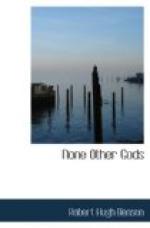PART II
CHAPTER I
(I)
Barham, as all Yorkshire knows, lies at the foot of a long valley, where it emerges into the flatter district round Harrogate. It has a railway all to itself, which goes no further, for Barham is shut in on the north by tall hills and moors, and lies on the way to nowhere. It is almost wholly an agricultural town, and has a curious humped bridge, right in the middle of the town, where men stand about on market days and discuss the price of bullocks. It has two churches—one, disused, on a precipitous spur above the town, surrounded by an amazingly irregular sort of churchyard, full, literally, to bursting (the Kirkbys lie there, generation after generation of them, beneath pompous tombs), and the other church a hideous rectangular building, with flat walls and shallow, sham Gothic windows. It was thought extremely beautiful when it was built forty years ago. The town itself is an irregular and rather picturesque place, with a twisting steep High Street, looking as if a number of houses had been shot at random into this nook among the hills and left to find their own levels.
The big house where the Kirkbys have lived since the middle of the seventeenth century is close to the town, as the squire’s house ought to be, and its park gates open right upon the northern end of the old bridge. There’s nothing of great interest in the house (I believe there is an old doorway in the cellar, mentioned in guide-books), since it was rebuilt about the same time as the new church first rose. It is just a big, comfortable, warm, cool, shady sort of house, with a large hall and a fine oak staircase, surrounded by lawns and shrubberies, that adjoin on the west the lower slopes, first of the park and then of the moors that stretch away over the horizon.
There is a pleasant feudal air about the whole place—feudal, in a small and neighborly kind of way. Jack’s father died just a year before his only son came of age; and Jack himself, surrounded by sisters and an excellent and beneficently-minded mother, has succeeded to all the immemorial rights and powers, written and unwritten, of the Squire of Barham. He entertained me delightfully for three or four days a few months ago, when I was traveling about after Frank’s footsteps, and I noticed with pleasure as we drove through the town that there was hardly a living creature in the town whom he did not salute; and who did not salute him.
He took me first to the bridge and pulled up in the middle of it, to point out a small recess in it, over the central pier, intended, no doubt, to give shelter to foot-passengers before the bridge was widened, in case a large vehicle came through.
“There,” he said. “That’s the place I first saw Frank when he came.”
We drove on up through the town, and at the foot of the almost precipitous hill leading up to the ruined church we got out, leaving the dog-cart in charge of the groom. We climbed the hill slowly, for it was a hot day, Jack uttering reminiscences at intervals (many of which are recorded in these pages) and turned in at the churchyard gate.




